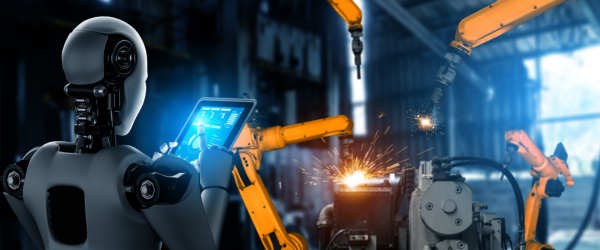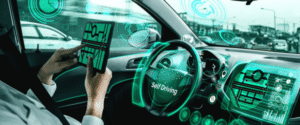Robots at Work: Will AI Take Your Job?

Artificial Intelligence (AI) and robotics are transforming the way we work. From self-checkout machines to AI-powered customer service, automation is replacing repetitive tasks in various industries. But does this mean robots at work will take over all human jobs? Or will AI create new opportunities? Let’s explore the future of automation and its impact on employment.
1. How Robots and AI Are Changing the Workplace
Technology has always played a role in shaping jobs. AI and robotics are simply the next step in workplace evolution.
Industries Where Robots Are Making an Impact:
- Manufacturing: AI-powered robots handle assembly lines and logistics.
- Retail: Self-checkout machines and AI-driven inventory management are reducing human tasks.
- Healthcare: AI assists in medical diagnoses, robotic surgery, and patient care.
- Customer Service: Chatbots and virtual assistants handle routine customer inquiries.
- Transportation: Self-driving cars and drones are changing logistics and delivery services.
Example: Amazon’s warehouse robots sort and pack products, speeding up deliveries while reducing human labor.
2. The Types of Jobs AI and Robots Are Replacing
While AI enhances efficiency, it also automates repetitive jobs. These roles are at the highest risk of automation:
High-Risk Jobs for Automation:
- Data Entry & Clerical Work: AI processes and organizes large amounts of data faster than humans.
- Cashiers & Retail Workers: Self-checkout systems are replacing traditional cashiers.
- Factory & Warehouse Jobs: Robotics streamline production, requiring fewer human workers.
- Telemarketing & Customer Support: AI chatbots and virtual assistants handle most basic customer inquiries.
- Truck Drivers & Delivery Services: Self-driving vehicles are being tested for deliveries.
Example: Many fast-food chains are testing AI-powered drive-thrus and self-service kiosks, reducing the need for human cashiers.
3. The Jobs AI and Robots Can’t Replace
While AI is powerful, there are many jobs that require human creativity, emotional intelligence, and complex decision-making—things robots can’t easily replicate.
Jobs That Will Still Require Humans:
- Creative Professions: Writers, designers, musicians, and artists rely on creativity.
- Healthcare Professionals: Doctors, nurses, and therapists provide care beyond AI’s capabilities.
- Education & Training: Teachers and mentors adapt learning experiences to individuals.
- Skilled Trades: Plumbers, electricians, and carpenters require hands-on expertise.
- Leadership Roles: Managers, executives, and strategists make high-level business decisions.
Example: AI can assist in diagnosing diseases, but doctors are still needed to provide treatment and empathy.
4. How AI and Robotics Are Creating New Job Opportunities
Instead of eliminating jobs, AI is also creating new careers and transforming existing roles.
Growing Job Sectors Due to AI:
- AI and Machine Learning Engineers – Developing smart algorithms.
- Robotics Technicians – Maintaining and programming robots.
- Cybersecurity Experts – Protecting AI systems from hacking.
- Data Scientists – Analyzing AI-generated insights.
- AI Ethics Specialists – Ensuring fair and responsible AI use.
Example: As automation grows, companies need AI specialists to develop and manage smart systems.
5. The Future of Human-AI Collaboration
Rather than replacing humans, AI is evolving into a co-worker that enhances productivity.
Ways Humans & AI Will Work Together:
- Augmented Decision-Making: AI provides insights, but humans make the final call.
- AI-Powered Assistants: Employees use AI tools for faster task completion.
- Hybrid Workforces: Companies integrate human workers with AI-driven automation.
Example: AI-powered medical tools help doctors diagnose diseases, but they still rely on human expertise for treatment.
6. How to Stay Relevant in an AI-Driven Workforce
To thrive in an AI-powered workplace, upskilling and adaptability are key.
How to Future-Proof Your Career:
- Learn Digital & AI Skills: Understanding how AI works is valuable in any industry.
- Develop Critical Thinking & Problem-Solving: Skills that AI can’t replicate.
- Focus on Creativity & Innovation: AI lacks human imagination.
- Strengthen Emotional Intelligence: Jobs requiring social interaction will always need humans.
Example: Employees who upskill in AI-related fields are more likely to secure future job opportunities.
7. Ethical Concerns About AI and Job Automation
While AI brings benefits, it also raises important ethical questions about job security and fairness.
Concerns About AI & Jobs:
- Job Loss & Economic Disruption – How will governments and businesses support displaced workers?
- AI Bias & Decision-Making – Can AI systems be fair and unbiased?
- Privacy & Surveillance – How will AI affect personal data security?
Example: Governments are exploring universal basic income (UBI) as a potential solution to job losses caused by automation.
Conclusion
AI and robotics are transforming the workplace, but they won’t replace all jobs. While automation is eliminating repetitive tasks, it is also creating new career opportunities and improving workplace efficiency.
The key to thriving in the future of work is adapting, learning new skills, and embracing AI as a tool rather than a competitor. The future isn’t just about robots—it’s about how humans and AI can work together to build a better, smarter world.












